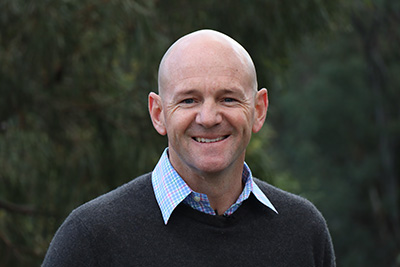Cool Soil Initiative
‘A chance to be on the front foot.’ That’s how southern NSW farmer John Bruce describes a project that’s working with wheat growers to investigate opportunities to reduce on-farm greenhouse gas (GHG) emissions.
The ‘Cool Soil Initiative’ is a Food Agility Cooperative Research Centre (CRC) project with Charles Sturt University through the Graham Centre, the not-for-profit Food Sustainability Lab, and manufacturers Mars Petcare, Kellogg’s and the Manildra Group.
 Mr Bruce (pictured) has already seen the benefits of this approach.
Mr Bruce (pictured) has already seen the benefits of this approach.
He describes himself as one of the ‘original guinea pigs’ in a 2017 pilot program through Riverine Plains Inc, the Sustainable Food Lab and Mars Petcare.
“We operate a mixed farming business near Barooga growing winter crops, turning off first-cross lambs, and producing summer crops when there’s water available for irrigation,” Mr Bruce said.
“We supplied cropping records, details such as inputs like fertiliser and chemical applications, stubble management and yields.
“That combined with the GPS linked soil testing gave us more information about what was happening in our cropping systems.
“It wasn’t a time consuming or onerous task and we were well supported by the project staff.”
Mr Bruce said his experience in the project has reinforced his decision making.
“The project hasn’t caused us to make wholesale changes to the way we manage our stubble but it has definitely made us more conscious of how we manage it,” Mr Bruce said.
“We are transitioning to a full stubble retention system with the intention to move away from burning.
“The last two years of drought has shown us that ground cover is paramount and the goal is to move to a disc-seeder and stripper front for our harvester.
“In my own mind and from talking to other farmers that are running this system, it is a big contributor to improving soil health and hopefully help reduce our greenhouse gas emissions.”
He can also see a need for the grain supply chain to be able to prove its sustainability credentials.
“As the movement to tackle climate change gains momentum agriculture needs to be on the front-foot, to have the information available to improve sustainability,” Mr Bruce said.
“Importantly we also need to be able to demonstrate what we are doing and the impact of those farming practices.”
The pilot project has paved the way for the new ‘Cool Soil Initiative’ with a $2 million investment, new industry partners, and strengthened research capacity.
Charles Sturt Professor of Food Sustainability Professor Niall Blair said climate change is one of the biggest challenges facing Australian farmers today.
 “We know agriculture is a big contributor of greenhouse gas emissions. But we also know it can be a big part of the solution.
“We know agriculture is a big contributor of greenhouse gas emissions. But we also know it can be a big part of the solution.
“This project is unique as it has been driven by food manufacturing companies who have committed to supporting sustainable supply of key commodities.
“They’re working with farmers to investigate opportunities to mitigate GHG emissions and improve soil health, without compromising farm productivity and profitability.”
The project will work with up to 200 farmers on 700 000 hectares through Riverine Plains Inc, FarmLink Research and Central West Farming Systems over the next three years.
The project will support them to better understand how crop management practices, such as rotations and stubble management impact on soil health and GHG emissions.
Graham Centre senior research fellow in spatial agriculture, Jon Medway will be involved in the research to improve spatial estimates of soil carbon, refine soil sampling methods and to provide spatial data to participating farmers so that it can be used in decision making.
The project will also evaluate the online greenhouse gas calculator, Cool Farm Tool, to quantify emissions in an Australian farming context so we can effectively measure and track changes on-farm over time.
Find out more about the project on our website or contact your farming systems group to find out how you can be involved.